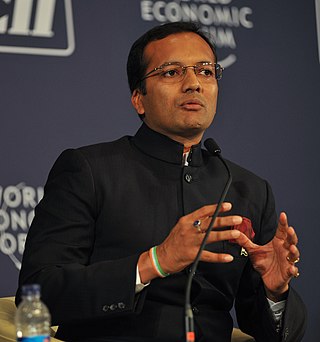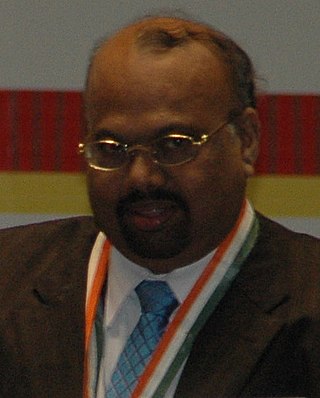
Naveen Jindal is an Indian billionaire industrialist, philanthropist, and a former Member of Parliament, Lok Sabha from Kurukshetra, Haryana in the 14th and 15th Lok Sabha. He currently serves as the Chairman of Jindal Steel and Power Limited and Chancellor of O. P. Jindal Global University.

Madhubani art is a style of painting practiced in the Mithila region of India and Nepal. It is named after the Madhubani district of Bihar, India, which is where it originated. Artists create these paintings using a variety of mediums, including their own fingers, or twigs, brushes, nib-pens, and matchstick. The paint is created using natural dyes and pigments. The paintings are characterised by their eye-catching geometrical patterns. There is ritual content for particular occasions, such as birth or marriage, and festivals, such as Holi, Surya Shasti, Kali Puja, Upanayana, and Durga Puja.

Sucheta Dalal is an Indian business journalist and author. She has been a journalist for over two decades and was awarded a Padma Shri for journalism in 2006. She was the Financial Editor for the Times of India until 1998 when she joined the Indian Express group as a Consulting Editor, leaving in 2008. She is known for exposing the 1992 stock market scam propagated by Harshad Mehta.
The Indian Ordnance Factories Service (IOFS) is a civil service of the Government of India. IOFS officers are Gazetted defence-civilian officers under the Ministry of Defence. They are responsible for the administration of the Indian Ordnance Factories, which provide the indigenous defence production capabilities of India.
Devi Dutt Sharma is an Indian scholar and writer of Dogri literature, best known for his writings on Himalayan dialects, culture and ethnic history. The Government of India honored Sharma in 2011, with the fourth highest civilian award of Padma Shri.
Lokesh Kumar Singhal is an Indian metallurgical engineer known for his expertise in steel making and for the innovations he brought into the steelmaking industry in India. He was honored by the Government of India in 2012 with the fourth highest Indian civilian award, the Padma Shri.
Sachchidanand Sahai is an Indian epigraphist, writer and the scientific advisor to the Government of Cambodia for restoration of Angkor Wat and the Temple of Preah Vihear, known for his knowledge on Khmer civilization. He was honored by the Government of India, in 2012, with the fourth highest Indian civilian award of Padma Shri.

B. Ravi Pillai is a Dubai-based Indian billionaire businessman. He is the founder and chairman of the RP Group. As of May 2023, his net worth is estimated at US$3.1 billion.

Cheril Krishna Menon was an Indian entrepreneur and philanthropist. He was the Chairman and Managing Director of Behzad Corporation, headquartered in Doha, Qatar, which has presence in many other countries. He received the 2006 Pravasi Bharatiya Samman and in 2009 received the fourth highest Indian civilian award, Padma Shri, from Government of India, in 2009, with. He died after prolonged illness at Apollo Hospital, Chennai on 1 October 2019, aged 70.
Kshetrimayum Ongbi Thouranisabi Devi is an Indian classical dancer and author, specialising in the Indian classical dance form of Manipuri. She was honoured by the Government of India in 2003 with Padma Shri, the fourth highest Indian civilian award.
Bir Bhan Bhatia was an Indian physician and a former member of the Legislative Council of the United Provinces in the British India. The Government of India honoured him in 1954, with the award of Padma Shri, the fourth highest Indian civilian award for his contributions to medicine, placing him among the first recipients of the award.
Bal Raj Nijhawan, was an Indian metallurgist, author and the first Director of Indian origin of the National Metallurgical Laboratory, Council of Scientific and Industrial Research (CSIR). He was a recipient of Shanti Swarup Bhatnagar Prize, the highest Indian science award, which he received in 1964 in the Engineering sciences category. The Government of India honoured him in 1958, with the award of Padma Shri, the fourth highest Indian civilian award for his services to the nation.
A. Nagappa Chettiar (1915-1982) was an Indian industrialist and one of the pioneers of the Indian leather industry.

Krishna Gopal Saxena (1912–2003) was an Indian homoeopathic physician. Born on 25 September 1912 in Delhi, he did his schooling at Karachi and Ambala and graduated in homoeopathic medicine from the Calcutta Homoeopathic Medical College.
Lilian G. Lutter was a British educationist who spent most part of her career in India. She was the founder principal of the Maharani Gayatri Devi Girls' Public School, the first all Girls school in the state of Rajasthan, an institution founded by Gayatri Devi of Jaipur with 24 students in 1943. She was honoured by the Government of India in 1970 with Padma Shri, the fourth highest Indian civilian award.
Rani Lila Ramkumar Bhargava was an Indian freedom fighter, social worker, educationist and a former leader of the Indian National Congress. She was an associate of Indian prime minister, Indira Gandhi and was married into the family of Munshi Nawal Kishore, the founder of reportedly the oldest printing press in Asia, Nawal Kishore Press, to Munshi Ramkumar Bhargava, a fourth generation member of the family and the holder of the title of Raja from Lord Wavell, then Viceroy of India,
Savita Behen (1919-2009) was an Indian politician, social worker, educationist and a former member of Rajya Sabha, the upper house of the bicameral Indian Parliament. She was known to be an advocate of women empowerment and gender equality and was listed among the 3300 distinguished living women of the world by the Council for Parity Democracy in 1990. She was honoured by the Government of India in 1971 with Padma Shri, the fourth highest Indian civilian award.
Badri Prasad Bajoria (1925–1976) was an Indian social worker, philanthropist, educationist and the founder of Shri Baldev Dass Bajoria Inter College, Kamala Devi Bajoria Degree College and Seth Baldev Dass Bajoria District Hospital. He was born in 1925 in Saharanpur in the Indian state of Uttar Pradesh to Kamla Devi and Baldev Dass Bajoria and was married to Savitri Devi. He was the co-founder of institutions such as Shrimati Kamla Devi Saraswati Shishu Mandir, Bajoria Sanatan Dharam Sankirtan Bhawan and Gandhi centenary Kamla Devi Bajoria Memorial Ganna Eye Hospital. He was honoured by the Government of India in 1972 with the Padma Shri, the fourth highest Indian civilian award.
Bindhyavasini Devi was an Indian folk musician. She was popularly recognised as Bihar Kokila. She was the founder of Vindhya Kala Mandir, a Patna based music academy promoting folk music, Vindhya Kala Mandir. The academy is associated with Bhatkhande University, Lucknow for 55 years now which is now run by her daughter-in-law Shobha Sinha, son Sudhir Kumar Sinha. She was born in Muzzafarpur in the Indian state of Bihar and specialised in Maithili, Bhojpuri and Magahi folk music. She also sang a popular song, Chhote Dulha Ke, in a movie, Vivah Geet and many of her songs have been released in CD format.





